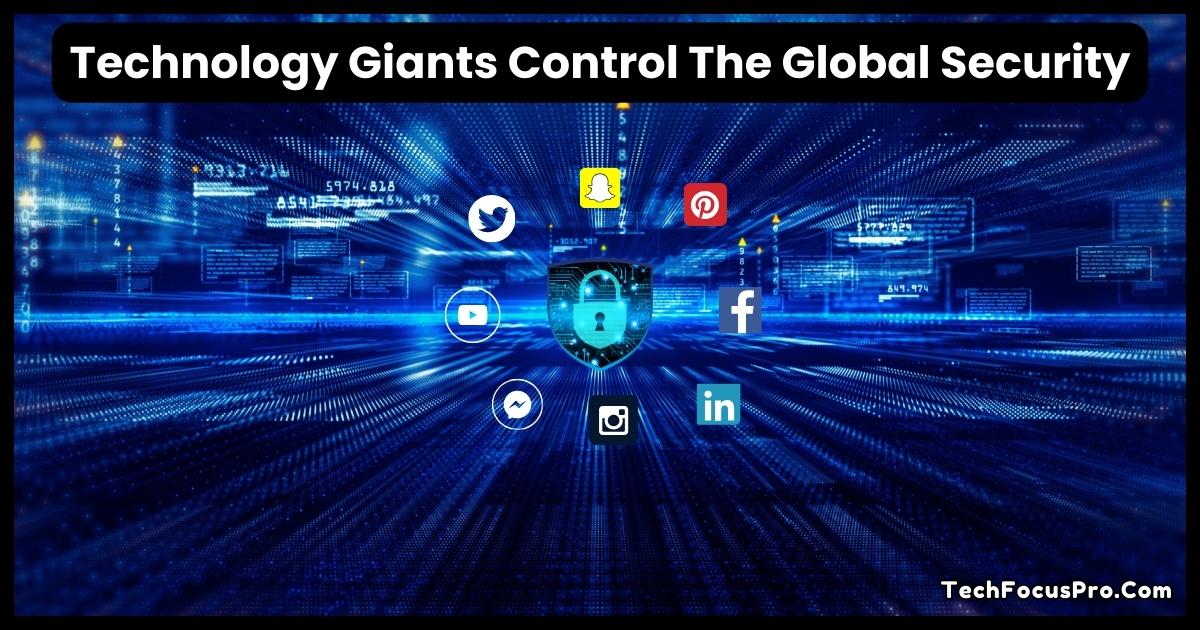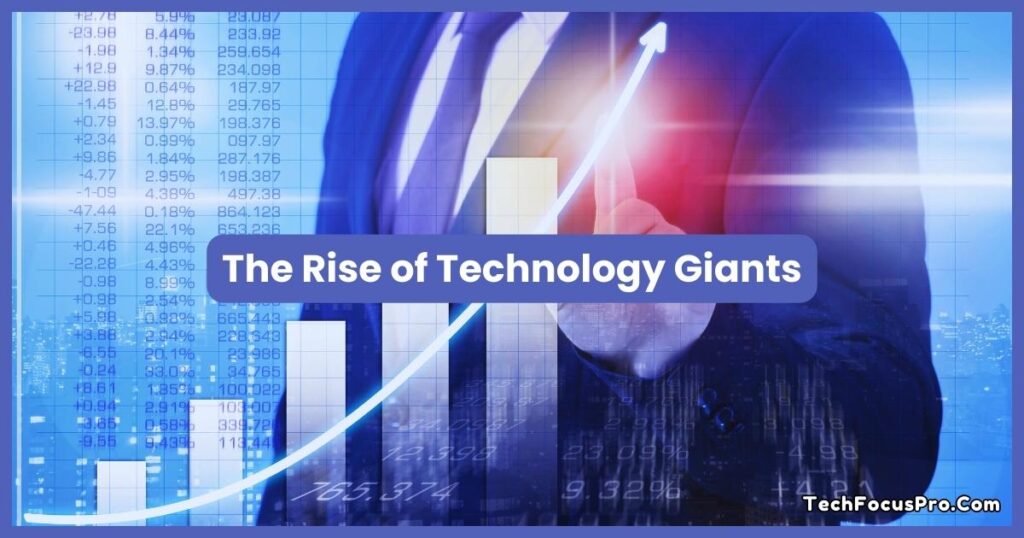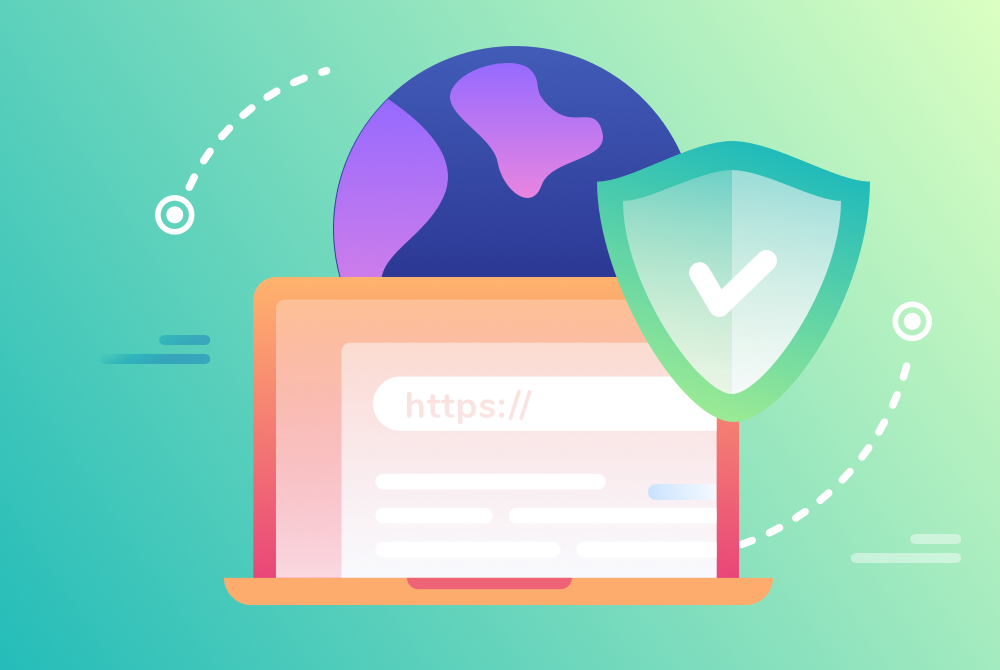Technology giants like Google, Apple, and Microsoft control global security by managing vast amounts of user data. They provide crucial security infrastructure and encryption technologies.
In today’s digital age, technology giants play a pivotal role in global security. Companies like Google, Apple, and Microsoft have access to vast amounts of user data, making them key players in safeguarding sensitive information. Their advanced encryption technologies and security infrastructures protect against cyber threats and data breaches.
These tech giants invest heavily in research and development to stay ahead of potential security vulnerabilities. Their influence extends to shaping security protocols and standards worldwide. As our reliance on digital platforms grows, the role of these technology giants in maintaining global security becomes increasingly indispensable.
The Rise Of Tech Titans In Security
Technology giants are reshaping global security. Companies like Google, Apple, and Microsoft now play critical roles. They manage vast amounts of data and develop advanced security solutions. These tech titans influence how we protect our digital lives.
Shifting Power Dynamics
The power dynamics in global security are shifting. Governments once controlled national security. Now, technology companies hold significant sway. They have the resources and expertise needed for modern security challenges. This shift changes how security decisions are made.
Tech companies invest heavily in cybersecurity. They develop cutting-edge tools to protect data. Their efforts often surpass those of traditional security agencies. This new reality places tech giants at the forefront of global security.
Silicon Valley’s New Battlefield
Silicon Valley is the new battlefield for global security. Companies there compete to develop the best security technologies. They focus on innovation and speed. This competition drives rapid advancements in cybersecurity.
Security startups emerge regularly in Silicon Valley. They bring fresh ideas and approaches. Established tech giants acquire these startups to bolster their own capabilities. This dynamic environment fosters continuous improvement in security technology.
Here is a comparison of traditional security vs. tech-driven security:
| Aspect | Traditional Security | Tech-Driven Security |
|---|---|---|
| Decision-making | Government-led | Company-led |
| Resources | State-funded | Private investments |
| Innovation Speed | Slow | Rapid |
These shifts have profound implications. They redefine the landscape of global security. Tech companies continue to grow in influence. Their role in protecting our digital world is crucial.

Credit: techfocuspro.com
Assessing The Impact On Privacy
The power of technology giants affects our global security. An important aspect is how it impacts our privacy. Understanding these effects helps us navigate the digital world safely.
Data Collection Concerns
Technology giants gather vast amounts of data. This includes personal information, browsing history, and even location data. Data collection raises significant privacy concerns.
- Personal details like name, age, and address
- Browsing habits and online behavior
- Location tracking through devices
Companies often use this data for targeted advertising. This means they show ads based on your online activities. While it might seem convenient, it poses a risk to your privacy.
Data breaches are another concern. Hackers can access personal information stored by these companies. This can lead to identity theft and financial loss.
The Encryption Debate
Encryption is a method to protect data by converting it into a code. Only those with a key can read the encrypted data. This provides a layer of security for personal information.
However, there is an ongoing debate about encryption. Some argue that strong encryption is essential for privacy. It prevents unauthorized access to personal data.
On the other hand, law enforcement agencies face challenges. They claim that encryption can hinder investigations. They argue for backdoors, which allow them access to encrypted data.
The debate continues as both sides present valid points. Balancing privacy and security remains a critical issue.
| Pros of Encryption | Cons of Encryption |
|---|---|
| Protects personal data | Can hinder law enforcement |
| Prevents unauthorized access | Potential for misuse by criminals |
Understanding the impact on privacy is crucial. This helps users make informed decisions about their data.
Economic Implications Of Tech Dominance
Technology giants control global security. This dominance has economic implications. Understanding these implications is crucial. It affects businesses, governments, and consumers worldwide.
Market Monopolies
Tech giants like Google, Apple, and Microsoft have immense power. They control key markets. This creates market monopolies. These monopolies limit competition.
Limited competition can lead to higher prices. It can also reduce innovation. Small businesses struggle to compete. They face many barriers.
Tech giants also have vast resources. They invest heavily in security. Smaller companies cannot match this. This creates an uneven playing field.
Here is a table showing tech giants’ market share:
| Company | Market Share |
|---|---|
| 92% | |
| Apple | 27% |
| Microsoft | 76% |
The Cost Of Security
Security is expensive. Tech giants spend billions on it. This cost is passed to consumers. Products and services become more costly.
Here are some costs tech giants face:
- Research and development
- Cybersecurity infrastructure
- Compliance with regulations
These costs are significant. They impact pricing strategies. Consumers pay more for secure products. This affects affordability.
The economic implications are vast. They influence market dynamics. Understanding these factors is crucial.
Social And Political Considerations
Technology giants have a significant impact on global security. Their influence extends beyond just technology. They affect both social and political landscapes. This section explores the social and political considerations.
Influence On Democracy
Technology giants shape public opinion. They control the flow of information. Social media platforms can influence elections. They can sway voter opinions.
Political ads on these platforms can target specific groups. This can create echo chambers. People only see information that matches their beliefs. This can divide societies. It can weaken democratic processes.
Censorship And Control
These companies can censor information. They can control what content is visible. This power can be used to suppress dissent. It can silence voices that oppose certain views.
Governments may collaborate with tech giants. They may request the removal of certain content. This can lead to a lack of transparency. People may not trust the information they see.
| Aspect | Impact |
|---|---|
| Influence on Democracy | Shaping public opinion, targeting political ads, creating echo chambers |
| Censorship and Control | Suppressing dissent, collaborating with governments, lack of transparency |
In summary, the control technology giants have over information is immense. It affects both social and political spheres. This raises important questions about democracy and freedom.
Cybersecurity Threats And Tech Giants
Technology giants like Google, Apple, and Microsoft control global security. They face constant cybersecurity threats. These threats come from hackers and nation-states. Tech giants must protect user data and systems. Their role is crucial in maintaining global security.
Protecting Against Hackers
Hackers target tech giants for valuable data. This data includes personal information and financial details. To protect against hackers, tech giants use advanced security measures.
| Security Measure | Description |
|---|---|
| Encryption | Data is converted into a secure format. |
| Firewalls | Barriers that block unauthorized access. |
| Multi-Factor Authentication | Users must confirm their identity in multiple ways. |
Encryption ensures data is unreadable to unauthorized users. Firewalls act as barriers against unauthorized access. Multi-Factor Authentication adds an extra layer of security.
Nation-state Attacks
Nation-states target tech giants for political reasons. These attacks aim to steal secrets or disrupt services. Tech giants face sophisticated threats from nation-states.
- State-sponsored hacking groups
- Advanced persistent threats (APTs)
- Zero-day exploits
State-sponsored hacking groups have advanced tools and resources. They pose a significant threat to tech giants. Advanced persistent threats (APTs) are long-term attacks. They aim to steal data or disrupt operations. Zero-day exploits take advantage of unknown vulnerabilities. They are hard to detect and stop.
Tech giants must stay vigilant against these threats. They invest heavily in cybersecurity. Their efforts help protect users and systems worldwide.

Credit: cyber-180.com
Global Security Infrastructures
Global security infrastructures form the backbone of safety worldwide. Technology giants play a critical role in this. They develop advanced systems to protect nations from various threats. These systems include surveillance networks, cybersecurity solutions, and advanced communication tools.
Tech’s Role In National Defense
Technology giants contribute significantly to national defense. They provide cutting-edge tools for military operations. These tools include drones, satellite systems, and artificial intelligence (AI). They help in monitoring, reconnaissance, and tactical planning.
For example, drones can survey large areas quickly. Satellite systems offer real-time data. AI helps in analyzing threats and making quick decisions. These technologies make national defense more effective.
International Collaboration
International collaboration is essential for global security. Technology companies work with governments worldwide. They share data and resources to tackle global threats. This collaboration includes cybersecurity, counter-terrorism, and disaster response.
For instance, cybersecurity firms detect and prevent cyber-attacks. Counter-terrorism efforts involve sharing intelligence and technology. Disaster response teams use advanced tools for rescue and relief operations. This collaboration enhances global security.
| Technology | Role in Security |
|---|---|
| Drones | Surveillance and reconnaissance |
| Satellite Systems | Real-time data and communication |
| AI | Threat analysis and decision-making |
- Surveillance Networks: Monitor activities and prevent threats.
- Cybersecurity Solutions: Protect data and systems from cyber-attacks.
- Advanced Communication Tools: Ensure secure and reliable communication.
- Develop advanced surveillance networks.
- Implement strong cybersecurity measures.
- Enhance communication tools for security.
Ethical Challenges
The rise of technology giants has brought significant ethical challenges. These challenges stem from their influence over global security. Companies like Google, Apple, and Facebook hold immense power. They control vast amounts of data and information. This section explores the ethical dilemmas faced by these corporations.
Ai And Surveillance
Artificial Intelligence (AI) and surveillance technology play crucial roles in global security. These technologies can prevent crimes and identify threats. Yet, they also pose significant ethical questions.
AI algorithms can be biased. They might target specific groups unfairly. Surveillance systems can invade privacy. They can track every move of individuals. This raises concerns about personal freedoms. Balancing security and privacy is a major challenge.
Below is a table summarizing the key ethical concerns:
| Ethical Concern | Description |
|---|---|
| Bias in AI | AI systems may unfairly target specific groups. |
| Privacy Invasion | Surveillance can infringe on personal freedoms. |
Responsibility And Accountability
Responsibility and accountability are crucial ethical challenges for technology giants. These companies must ensure their technologies are used ethically. They need to be transparent about their data practices. They should also be accountable for any misuse of their technologies.
Here are some key responsibilities:
- Ensuring ethical AI development
- Protecting user data
- Being transparent about data usage
Accountability involves holding these companies responsible. If they misuse data or breach privacy, they should face consequences. This ensures they act ethically and respect user rights.

Credit: techfocuspro.com
The Future Landscape Of Security
The future of global security is evolving. Technology giants play a key role. They control vast amounts of data. They use advanced technologies. This control shapes the security landscape. Let’s explore two key areas: innovations and regulations.
Innovations On The Horizon
Artificial Intelligence (AI) is a game-changer. AI can predict and prevent cyber-attacks. Tech giants invest heavily in AI. They develop smart systems. These systems can detect threats quickly.
Blockchain technology ensures data integrity. It creates secure, transparent records. This technology is tamper-proof. It adds a layer of security. Tech companies use blockchain for secure transactions.
Quantum computing is the next frontier. It offers unparalleled processing power. Quantum computers can solve complex problems. They can break traditional encryption. This forces the industry to innovate further.
Biometric security is becoming mainstream. Tech giants use facial recognition. They also use fingerprint scanning. These methods enhance user security. They reduce the risk of unauthorized access.
Regulating The Tech Industry
Governments are stepping in. They create regulations to control tech companies. These rules ensure data privacy. They also protect users from misuse.
GDPR in Europe sets a high standard. It requires companies to handle data responsibly. Non-compliance leads to hefty fines. This law influences global practices.
CLOUD Act in the USA gives the government access to data. This includes data stored abroad. It ensures that tech giants cooperate with law enforcement.
Cybersecurity frameworks are evolving. They provide guidelines for best practices. These frameworks help companies stay compliant. They also enhance overall security.
Public awareness is crucial. Educating users about security practices is important. Tech giants run awareness campaigns. They teach users how to protect themselves online.
Frequently Asked Questions
How Does Technology Impact Global Security?
Technology enhances global security through advanced surveillance, cybersecurity measures, and improved communication. It also poses risks like cyber attacks and digital espionage.
What Do You Think Are The Major Threats Of Global Security In The Current Period?
Major global security threats include cyber-attacks, terrorism, nuclear proliferation, climate change, and geopolitical conflicts. These issues demand urgent international cooperation and solutions.
What Is Global Security And Why Is It Important?
Global security involves protecting nations from threats like terrorism, cyberattacks, and war. It’s crucial for maintaining peace, stability, and economic growth.
What Are The Measures Of Global Security?
Global security measures include international treaties, intelligence sharing, military alliances, cybersecurity protocols, and economic sanctions. These efforts aim to prevent conflicts, terrorism, and cyberattacks. Effective global security ensures peace and stability.
Conclusion
The dominance of technology giants in global security raises both opportunities and concerns. Their influence shapes our digital landscape. Balancing innovation with privacy and security is crucial. As consumers, staying informed and vigilant is essential. The future of global security will depend on collaboration and responsible practices from these powerful entities.


Leave a Reply
You must be logged in to post a comment.